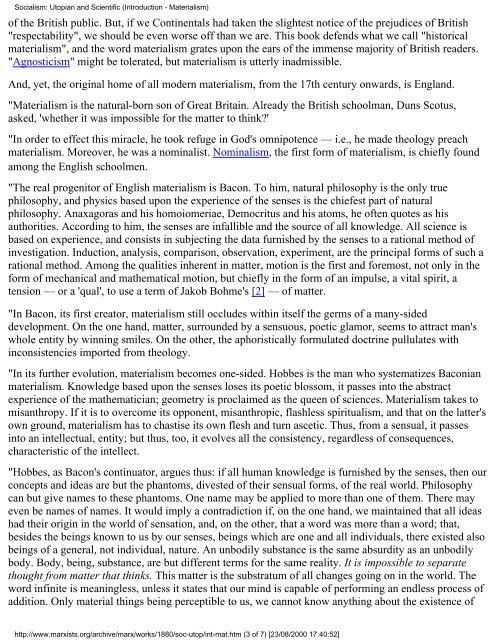Socialism: Utopian and Scientific - MIA
Socialism: Utopian and Scientific - MIA
Socialism: Utopian and Scientific - MIA
Create successful ePaper yourself
Turn your PDF publications into a flip-book with our unique Google optimized e-Paper software.
<strong>Socialism</strong>: <strong>Utopian</strong> <strong>and</strong> <strong>Scientific</strong> (Introduction - Materialism)of the British public. But, if we Continentals had taken the slightest notice of the prejudices of British"respectability", we should be even worse off than we are. This book defends what we call "historicalmaterialism", <strong>and</strong> the word materialism grates upon the ears of the immense majority of British readers."Agnosticism" might be tolerated, but materialism is utterly inadmissible.And, yet, the original home of all modern materialism, from the 17th century onwards, is Engl<strong>and</strong>."Materialism is the natural-born son of Great Britain. Already the British schoolman, Duns Scotus,asked, 'whether it was impossible for the matter to think?'"In order to effect this miracle, he took refuge in God's omnipotence — i.e., he made theology preachmaterialism. Moreover, he was a nominalist. Nominalism, the first form of materialism, is chiefly foundamong the English schoolmen."The real progenitor of English materialism is Bacon. To him, natural philosophy is the only truephilosophy, <strong>and</strong> physics based upon the experience of the senses is the chiefest part of naturalphilosophy. Anaxagoras <strong>and</strong> his homoiomeriae, Democritus <strong>and</strong> his atoms, he often quotes as hisauthorities. According to him, the senses are infallible <strong>and</strong> the source of all knowledge. All science isbased on experience, <strong>and</strong> consists in subjecting the data furnished by the senses to a rational method ofinvestigation. Induction, analysis, comparison, observation, experiment, are the principal forms of such arational method. Among the qualities inherent in matter, motion is the first <strong>and</strong> foremost, not only in theform of mechanical <strong>and</strong> mathematical motion, but chiefly in the form of an impulse, a vital spirit, atension — or a 'qual', to use a term of Jakob Bohme's [2] — of matter."In Bacon, its first creator, materialism still occludes within itself the germs of a many-sideddevelopment. On the one h<strong>and</strong>, matter, surrounded by a sensuous, poetic glamor, seems to attract man'swhole entity by winning smiles. On the other, the aphoristically formulated doctrine pullulates withinconsistencies imported from theology."In its further evolution, materialism becomes one-sided. Hobbes is the man who systematizes Baconianmaterialism. Knowledge based upon the senses loses its poetic blossom, it passes into the abstractexperience of the mathematician; geometry is proclaimed as the queen of sciences. Materialism takes tomisanthropy. If it is to overcome its opponent, misanthropic, flashless spiritualism, <strong>and</strong> that on the latter'sown ground, materialism has to chastise its own flesh <strong>and</strong> turn ascetic. Thus, from a sensual, it passesinto an intellectual, entity; but thus, too, it evolves all the consistency, regardless of consequences,characteristic of the intellect."Hobbes, as Bacon's continuator, argues thus: if all human knowledge is furnished by the senses, then ourconcepts <strong>and</strong> ideas are but the phantoms, divested of their sensual forms, of the real world. Philosophycan but give names to these phantoms. One name may be applied to more than one of them. There mayeven be names of names. It would imply a contradiction if, on the one h<strong>and</strong>, we maintained that all ideashad their origin in the world of sensation, <strong>and</strong>, on the other, that a word was more than a word; that,besides the beings known to us by our senses, beings which are one <strong>and</strong> all individuals, there existed alsobeings of a general, not individual, nature. An unbodily substance is the same absurdity as an unbodilybody. Body, being, substance, are but different terms for the same reality. It is impossible to separatethought from matter that thinks. This matter is the substratum of all changes going on in the world. Theword infinite is meaningless, unless it states that our mind is capable of performing an endless process ofaddition. Only material things being perceptible to us, we cannot know anything about the existence ofhttp://www.marxists.org/archive/marx/works/1880/soc-utop/int-mat.htm (3 of 7) [23/08/2000 17:40:52]














![tyf Enf=O=n]lgg](https://img.yumpu.com/47584932/1/190x245/tyf-enfonlgg.jpg?quality=85)

